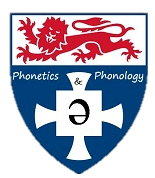-
News:
Accent Articulation Conference First Language Acquisition gamification Group focuses Job Laboratory Phonology Lecturer Linguistics Morphology Perception PhD Funding Phonetics Phonetics and Phonology Phonology Professor Project on Tyneside English Psycholinguistics R Research associate science open day Sociolinguistics Sociophonetics Speech Signal Analysis Speech signal processing statistics Workshop
Category Archives: Job Vacancies
Job: Lecturer/Senior Lecturer
For current researchers in this area at the university you can see the Phonetics & Phonology research groups people page.Posted date: 06-Dec-2021Closing date: 10-Jan-2022 More Information Full job description can be found at here. The Role The School of Education, Communication and … Continue reading
Job: Research Assistant (Laboratory Manager)
For current researchers in this area at the university you can see the Phonetics & Phonology research groups people page.Posted date: 23-Nov-2021Closing date: 7-Dec-2021 More Information Full job description can be found at here. The Role The School of Education, Communication and … Continue reading
Job: Lecturer in Phonetics and Phonology
Newcastle University’s School of English Literature, Language and Linguistics is looking to appoint a full-time lecturer in Phonetics and Phonology. For current researchers in this area at the university you can see the Phonetics & Phonology research groups people page. More Information Full job … Continue reading
Job Alert: Research Associate for Project on Tyneside English
Dr Sophie Meekings is looking for a Research Associate to work with her for five months. Closing Date: 06/02/2020 Role The School of English Literature, Language and Linguistics wishes to appoint a Research Associate in Linguistics. You will be responsible for … Continue reading
We’re Hiring! Professor of Linguistics
Many of you will know that long-standing Newcastle phonologist, SJ Hannahs, retired in January last year. However, it’s not all bad news, the School of English are hiring for a Professor of Linguistics. Closing Date: 12/02/2020Interview Date: 26/03/2020 More information … Continue reading
Lecturer Position in Phonetics & Phonology
The School of English Literature, Language and Linguistics wishes to appoint an outstanding scholar and teacher as a Lecturer in Phonetics and Phonology. Deadline – 7th July 2019 Candidate You will have a PhD, either in hand or near completion, … Continue reading
Teaching Fellow Position in Phonology
The School of English Literature, Language and Linguistics wishes to appoint an outstanding scholar and teacher as a full-time teaching fellow in phonology for 12 months fixed-term, to start 15th January 2019. https://www.jobs.ac.uk/job/BOG623/teaching-fellow-in-phonology-b172223a Candidate You will have a PhD, either … Continue reading
Posted in Job Vacancies
Tagged Job, Morphology, Phonetics, Phonology, Sociolinguistics
Leave a comment
PhD Studentships
Applications are invited for PhD studentships in linguistics and speech sciences at Newcastle University. We encourage applicants who are interested in all aspects of speech perception, production and learning. Studentships, to start in October 2019, will be awarded via open … Continue reading
Postdoc Position at University of Lisbon
Postdoc position in experimental research on language development Applications are invited for a full-time postdoctoral position in the School of Arts and Humanities of the University of Lisbon. The postdoctoral fellow will work in the Phonetics and Phonology lab and the Lisbon … Continue reading

